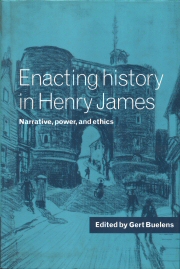Book contents
- Frontmatter
- Contents
- Notes on contributors
- Acknowledgments
- List of abbreviations
- Introduction
- 1 Power relations in the novels of James: the ‘liberal’ and the ‘radical’ version
- 2 Multiple germs, metaphorical systems, and moral fluctuation in The Ambassadors
- 3 James and the ethics of control: aspiring architects and their floating creatures
- 4 James and the shadow of the Roman Empire: manners and the consenting victim
- 5 ‘What Maisie knew’: Henry James's Bildungsroman of the artist as queer moralist
- 6 The double narrative of ‘The Beast in the Jungle’: ethical plot, ironical plot, and the play of power
- 7 Homoeroticism, identity, and agency in James's late tales
- 8 ‘A provision full of responsibilities’: senses of the past in Henry James's fourth phase
- 9 Possessing the American scene: race and vulgarity, seduction and judgment
- 10 History, narrative, and responsibility: speech acts in ‘The Aspern Papers’
- Index
7 - Homoeroticism, identity, and agency in James's late tales
Published online by Cambridge University Press: 02 February 2010
- Frontmatter
- Contents
- Notes on contributors
- Acknowledgments
- List of abbreviations
- Introduction
- 1 Power relations in the novels of James: the ‘liberal’ and the ‘radical’ version
- 2 Multiple germs, metaphorical systems, and moral fluctuation in The Ambassadors
- 3 James and the ethics of control: aspiring architects and their floating creatures
- 4 James and the shadow of the Roman Empire: manners and the consenting victim
- 5 ‘What Maisie knew’: Henry James's Bildungsroman of the artist as queer moralist
- 6 The double narrative of ‘The Beast in the Jungle’: ethical plot, ironical plot, and the play of power
- 7 Homoeroticism, identity, and agency in James's late tales
- 8 ‘A provision full of responsibilities’: senses of the past in Henry James's fourth phase
- 9 Possessing the American scene: race and vulgarity, seduction and judgment
- 10 History, narrative, and responsibility: speech acts in ‘The Aspern Papers’
- Index
Summary
Attention to historical pressures governing constructions of sexuality enables Jame's late tales to be read as responding to anxieties surrounding sexual identities in turn-of-the-century Britain and America. These tales attend to the construction of identities, rather than the expression of identities already constituted. In late James, identity is both burden and necessity, but, even as necessity, evanescent and intangible. The burden of Jamesian identity is the burden arising from relations which stop nowhere ― if identity is predicated on the subject's placement in a chain, what James, in the Prefaces, calls a ‘tangled web’ (LC-n, 1300, 1338), then crucial to such a construction are the relations admitted by the subject and those relations the subject repudiates or cannot admit in a given context. The play of identity in James's late tales revolves around such problems, questioning the legitimacy of any received ‘map of the social relations’, asking after other ways relations might be configured (GB, 11, 324).
James's late tales are highly ironic about the laws of prohibition governing their own production. Although they thematize respect for social decorum, they also zoom in on those parts of the body and bodily relations their very gentility would seem to require they ignore. In ‘Mora Montravers’ (1909), for instance, Jane and Sidney Traffle, a childless, middle-aged couple, become alarmed at the open manner in which their beautiful ‘niece’ Mora ― the daughter of Jane's dead half-sister ― has taken up residence with the no less beautiful painter Walter Puddick.
- Type
- Chapter
- Information
- Enacting History in Henry JamesNarrative, Power, and Ethics, pp. 126 - 147Publisher: Cambridge University PressPrint publication year: 1997
- 1
- Cited by

